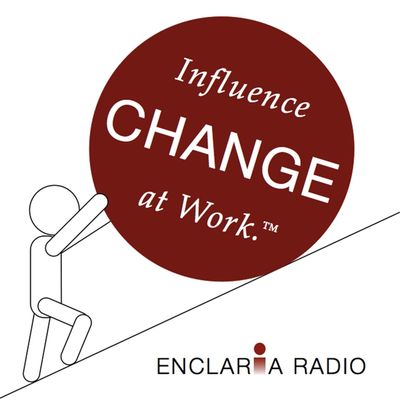The position of internal change agent – wherever it falls in the organization – can be a tricky one. You are responsible for influencing the organization, usually without the direct authority to do so. This show explores the different ways to influence organizational change, from the point of view of someone who is not calling the shots. (Formerly The Change Agent's Dilemma show.)
https://www.enclaria.com
Gesamtlänge aller Episoden: 2 days 5 hours 36 minutes
Episode 20: Building a New Culture from Scratch
Listen in as Tim Gardner, Director of Organizational Effectiveness at Kimberly-Clark Corporation, shares a case study of building a new and different culture in a greenfield manufacturing plant.
Episode 19: Join the Adventure: Become a Secret Change Agent at Work
Dot Olonovich, MBA student and change management researcher at Lehigh University, shares tips for how (and why) she transformed her life and organization by becoming a "secret change agent" at work.
Episode 18: Change Evaluation - Is Your Initiative Working?
This week's guest is Maria Gajewski of Changing River Consulting, whose expertise is nonprofit evaluation. She helps nonprofits assess whether or not their programs are making an impact. In this episode, Maria will share her process for evaluating whether initiatives are causing the desired results, and how it translates to organizational change.
Episode 17: Operating Excellence at Lockheed Martin
On this show, host Heather Stagl welcomes guest Christian Kress, Six Sigma Master Black Belt at Lockheed Martin to discuss his 23 years as an internal change agent within the company.
Episode 16: Monitor Your Organization's Non-Verbal Communication
It is widely cited that verbal communication makes up only 7% of a total message during a conversation. That is, 93% percent of the meaning within the conversation comes from outside the words that we use. These non-verbal aspects of communication include gestures, posture, intonation, and facial expressions. It turns out the concrete language is by far the least important factor in our interpretation and understanding of what the other person saying...
Episode 15: The Suggestion Guru on Employee Feedback
The Suggestion Guru Lara Fordis stops by The Change Agent's Dilemma to share a number of different tools you can use to collect employee feedback. She also shares factors to consider when selecting a feedback tool, and also talks about common mistakes you will want to avoid when you collect and use employee feedback. Curious about the 1-page Feedback Favorites list we mentioned on the show? Visit this page to find the link.
Episode 14: Ten Essential Tools for Change Agents
Do you feel like you're pushing a boulder uphill when it comes to changing your organization? Ever wonder if you are using all the tools at your disposal to make change happen? This week, host Heather Stagl outlines Ten Essential Tools for Change Agents, which you should be leveraging to influence change in your organization.
Episode 13: Performance Management Design for Organizational Change
The Change Agent's Dilemma welcomes Dr. Janet Hecht, Managing Principal of Talent by Design Consulting and Ph.D. in Industrial/Organizational Psychology, to share her experience and expertise in designing performance management systems to change organizations.
Episode 12: Make Personal Accountability a Core Value Using the QBQ
Bestselling author of QBQ: The Question Behind the Question John G. Miller stops by The Change Agent's Dilemma to share the concept of personal accountability and how to make it a core value in your organization.
Episode 11: Four Reasons NOT to Conduct an Employee Survey
Employee surveys are useful tools for understanding the beliefs, attitudes and opinions of an organization as a whole. Surveys are commonly used in pursuit of change to discover and understand organizational culture, resistance, morale, and a host of other characteristics that can shine the light on opportunities for improvement. However, not all surveys will improve the situation. Listen to hear four warning signs that conducting a survey may do more harm than good...
